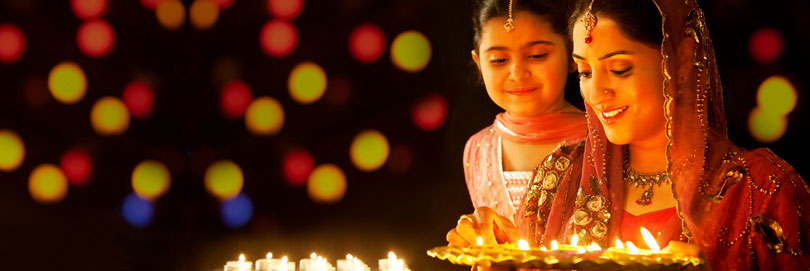Diwali As Harvest Festival

Diwali signifies Harvest Festival. As it occurs at the end of a cropping season and has along with the above customs, a few others that reinforce the hypothesis of its having originated as a harvest festival. Every harvest normally spelt prosperity. The celebration was first started in India by farmers after they reaped their harvests. They celebrated with joy and offered praises to God for granting them a good crop.
On the second day of Deepavali, a ritual that is strongly suggestive of the origin of Deepavali as an harvest festival is performed. Worship of the Goddess of Wealth, Laxmi and performance of Aarti are a part of the harvest festival. On this day delicacies are prepared from pounded semi-cooked rice called Poha or Pauva. This rice is taken from the fresh harvest available at that time. This custom is prevalent both in rural and urban areas especially in Western India.
In rural areas, Diwali signifies only this aspect. The reason being the fact that Diwali which is celebrated sometime in October/November co-incides with the end of a harvesting season, known as the Kharif season when the fresh crop of rice is available. Therefore, Diwali is also considered by many rural hindus to be the harvest festival when farmers offer prayers, and express their gratitude to the Almighty for the bounty they received from him.
- - Diwali Cards
- - Crackers
- - Dry Fruits
Festival Fun
- Diwali Rangoli
- Diwali Messages
- Diwali SMS
- Diwali Recipes
- Deep in Diwali
- Diwali Whatsapp Messages/Status
- Tradition of Playing Cards
- Pooja Thali Decorations
- Making Diwali Cards
- Diwali Essay
- Diwali Poems
- Diwali Songs
- Diwali Mela
- Diwali Wallpapers
- Diwali Decorative Items
- Diwali 2024
- Diwali Quotes
- Lakshmi Pooja
- Articles
- Lakshmi Ganesha Mantras
- Lakshmi Chalisa
- Diwali Solar Eclipse
- Diwali Remedies
- 108 Lakshmi Names
Diwali Rangoli
Indians love colors and its perfectly reflected in various ways. Rangoli is one such example that is a unique art work that is...Know More
Diwali in History
The history of Diwali is replete with legends and these legends are moored to the stories of Hindu religious scriptures...Know More
Diwali Messages
Enjoy the Best and the Most Heartfelt Diwali Messages from all entries received by us!!...Know More
Diwali Gift Ideas
Diwali is the epiphany of showing gratefulness to the almighty for blessing with wealth and wisdom. It is the time of illuminating...Know More





